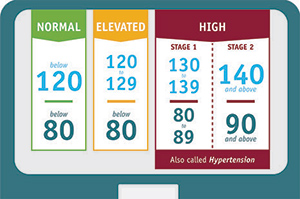Overview
Did you know that your blood pressure can be a good indicator of your heart health?
High blood pressure is common and a leading risk factor for heart disease and early death. It’s sometimes called the “silent killer” because many people don’t know they have it, yet it can do a lot of harm. So at your next health checkup, when your health care provider puts a cuff around your arm to take your blood pressure, be sure to ask about your numbers and what they mean.
If you already have high blood pressure, it’s important to know that even small reductions in your blood pressure can help protect your heart health and help prevent heart attacks, stroke, heart failure and chronic kidney disease.
What is Blood Pressure?
Blood pressure is a measure of how hard your blood pushes against your arteries as it moves through your body.
Blood pressure rises and falls naturally during the day. But if it stays too high, over time it can lead to health problems. High blood pressure is also called hypertension.
Facts About High Blood Pressure
- Nearly 1 in 2 adults in the U.S. have high blood pressure.
- Among middle-aged individuals, a majority (80-90%) will eventually have high blood pressure.
- High blood pressure is the leading cause of heart disease, heart attack, stroke – and early death. It’s also been tied to dementia and chronic kidney disease.
- It is usually very treatable.
- Because high blood pressure usually has no symptoms, the only way to know if it’s high is to have it checked. It’s also important to know if it runs in your family to keep a closer eye on your numbers.
Why Blood Pressure Matters
Blood pressure can affect your body in many ways. Untreated, high blood pressure increases the strain on the heart and arteries. It can weaken or damage the walls of the arteries, thicken the heart muscle, and puts added pressure on many organs. Over time, high blood pressure may eventually lead to:
- Blood vessel damage (atherosclerosis)
- Heart attack
- Stroke
- Heart failure
- Kidney failure
- Eye damage
Not surprisingly, the higher your blood pressure, the more likely you are to have these and other problems like dementia and vision loss. The good news? High blood pressure can be treated or even prevented.
What Do Your Numbers Mean?
Blood pressure is given as two numbers. You've probably heard your health care provider say something like "130 over 80." So what do these numbers mean?
- Systolic, the top number, is the pressure or force in the arteries when the heart pumps. When the heart contracts, the pressure in the arteries rises.
- Diastolic, the bottom number, is the pressure in the vessels when the heart relaxes between heartbeats.
These numbers are measured in millimeters of mercury (mm Hg).
- Normal blood pressure is less than 120 mm Hg systolic and less than 80 mm Hg diastolic
- High blood pressure is defined as 130 mm Hg or above or a diastolic blood pressure (lower number) of 80 mm Hg or above, or both. You can have high blood pressure even if just one of the numbers is above what it should be.

Even if your blood pressure is only slightly high, you need to take it seriously. Blood pressure measures that are close to the cutoff for having hypertension can serve as a red flag that it's time to step up efforts to prevent high blood pressure.
Talk with your health care team about how to check and track your blood pressure over time. And be sure you write down your target goal.
- Last Edited 08/12/2025
